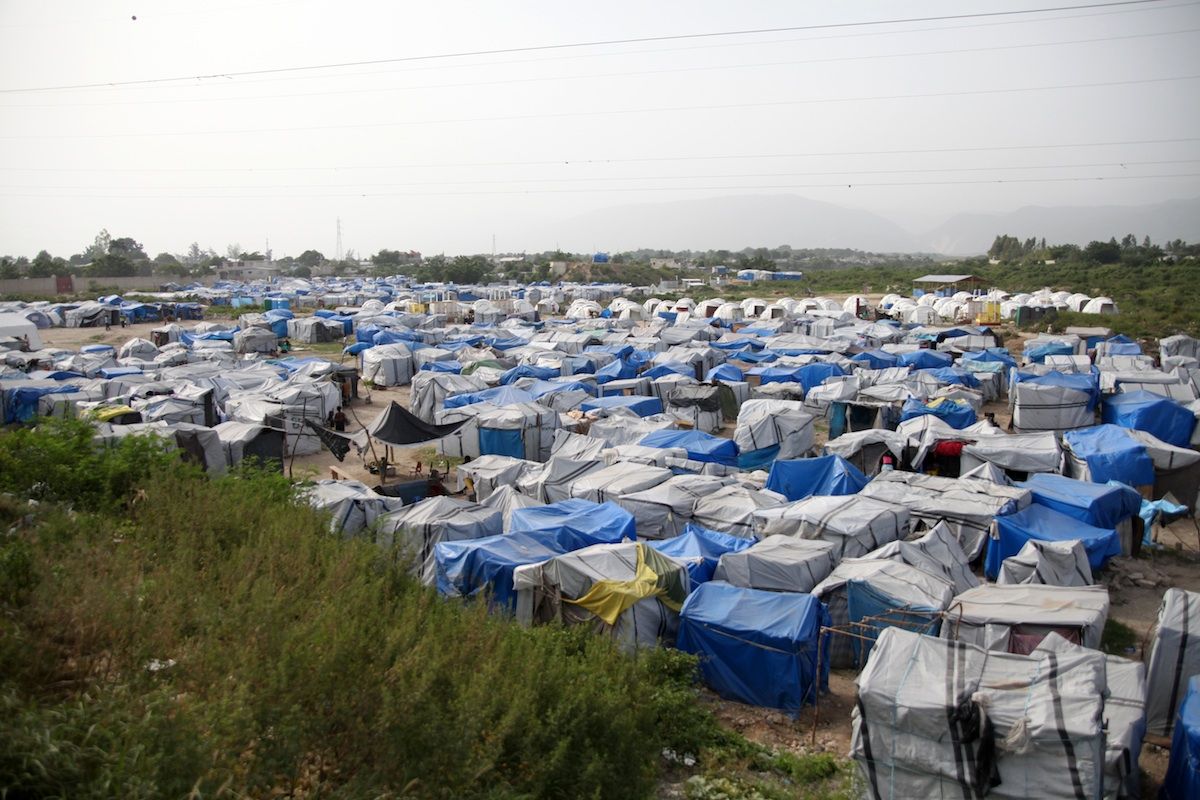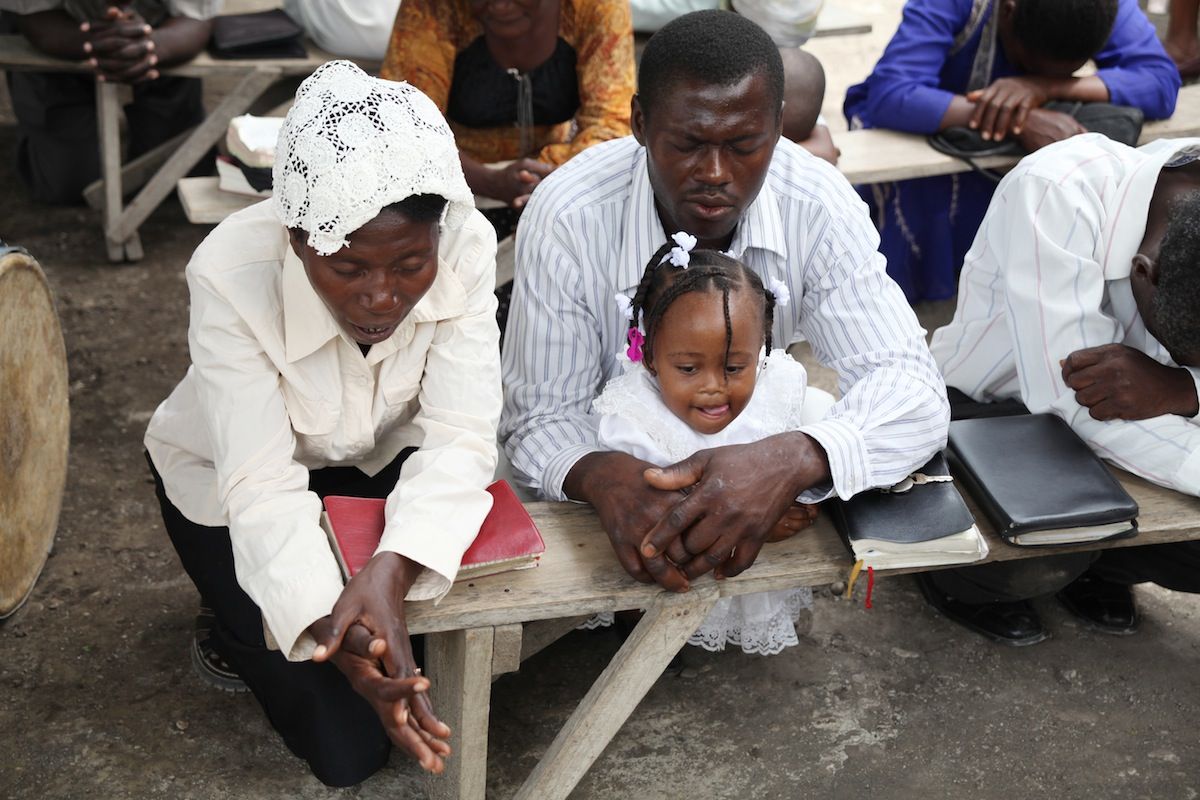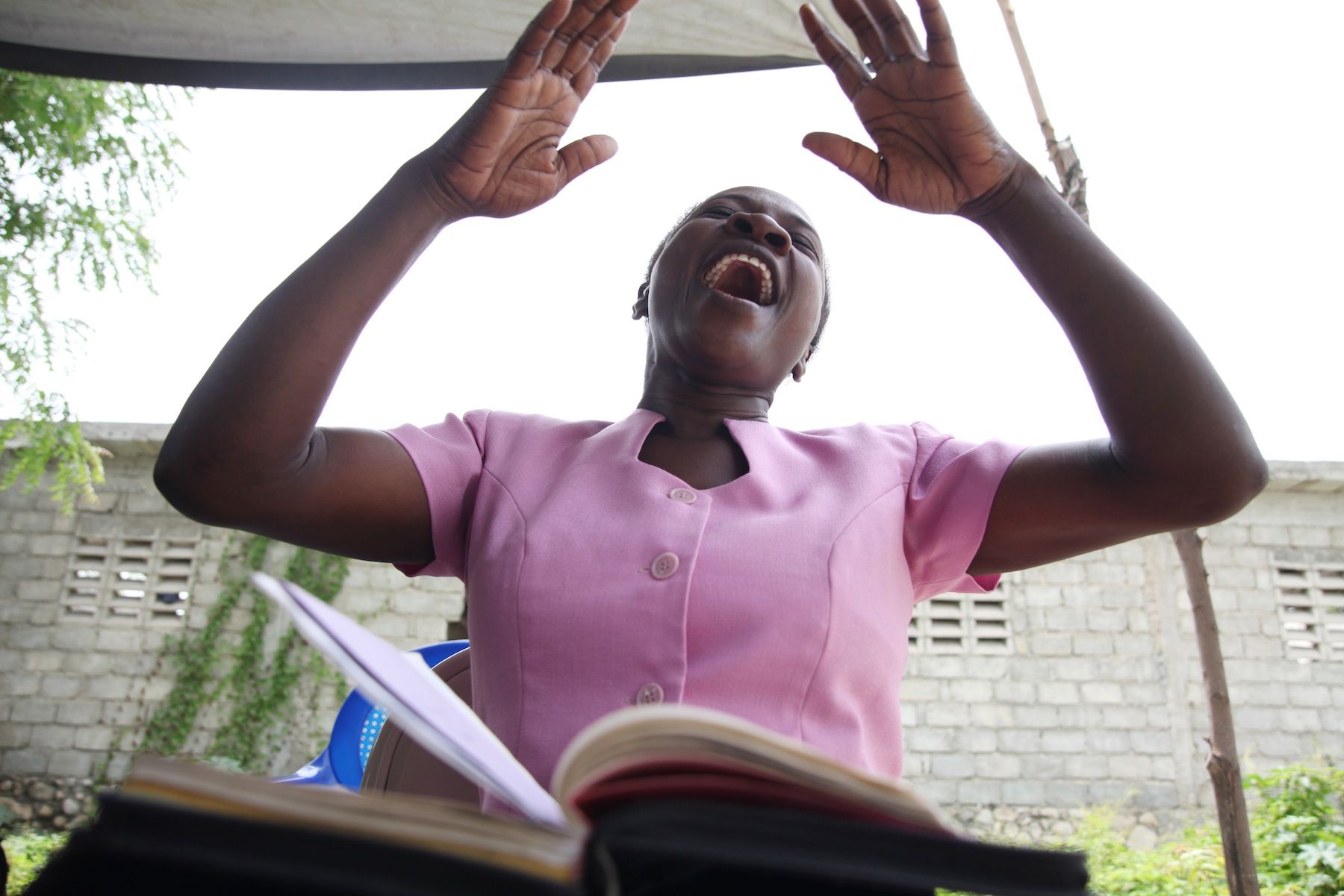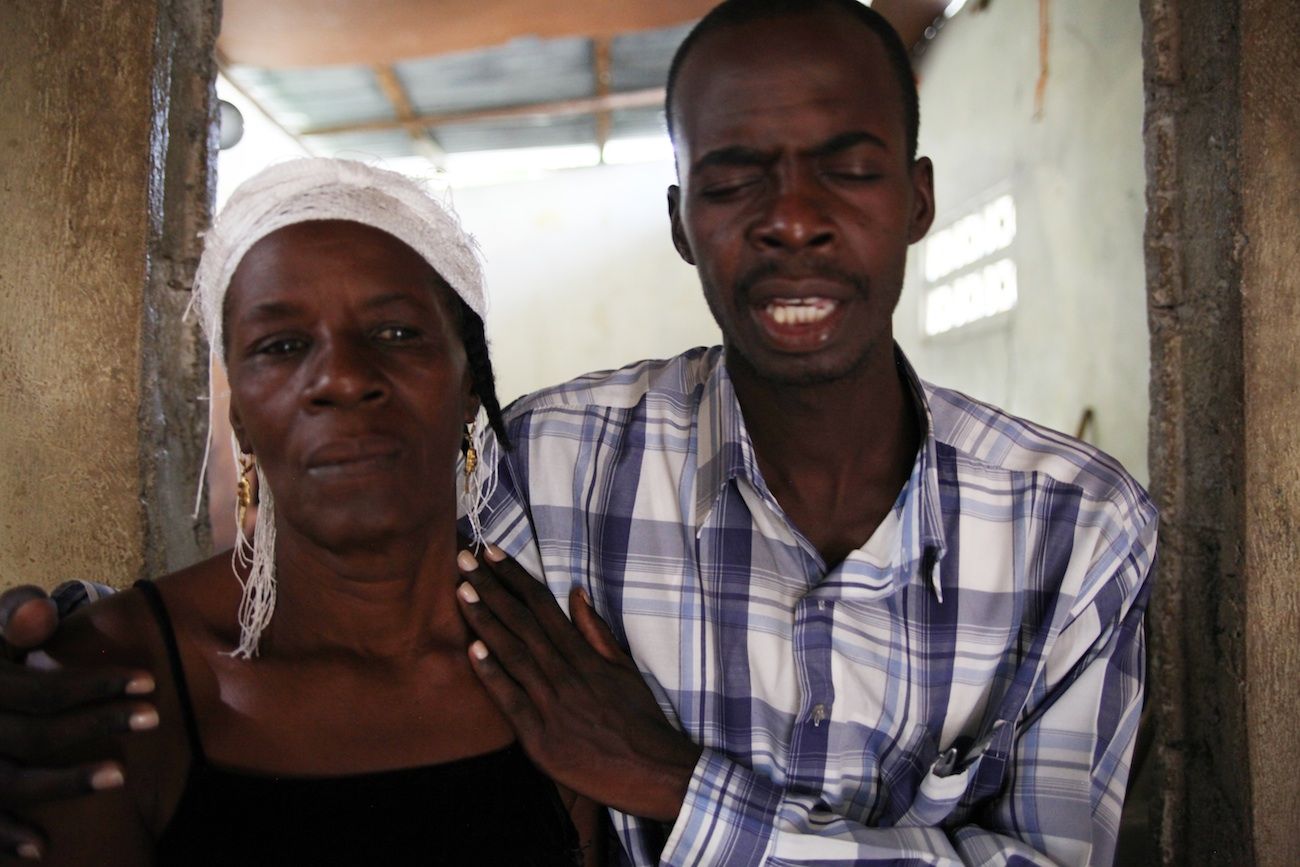We sat in the doorless doorway of the raw concrete shell of a church looking out into a yard where they had built a shelter with tarpaulin and three rough-hewn poles as their makeshift sanctuary. Concrete blocks and slabs of wood for benches, the occasional metal folded chair, a table for a pulpit, and the people. We watched them holding a service on a warm Sunday morning in Ganthier. I could pick up snippets of meaning in the preacher's Kreyol, having worked out where his text was from. He was talking about suffering, and counting it a joy to suffer; that it was a blessing to suffer. Andre, a Haitian man and my "fixer," sat beside me. We were far enough away from the service to talk in a low whisper. He said, "I don't accept that. It really upsets me to hear this. Do you know what he is saying?"
"No," I said. "What is he saying?"
"I don't know why some of these preachers accept suffering, why they tell us that it is a good thing to suffer. I don't agree with that. We are suffering; how can that be a good thing?" He was animated, and his eyes burned. "We have suffered so much; these people, some of them have not had a proper meal and he is telling them they must see suffering as blessing?"
I explained what I understood to be the theology of suffering, the existentialist undercurrent to Christianity: Solomon's conclusion in the book of Ecclesiastes (1:1-3) about the fallen state of humanity – that "all is vanity, vanity of vanities," the pure futility of it. Or Paul's simple equation to the first century Church in Corinth: "If the dead rise not, let us eat and drink for tomorrow we die" (15: 32). These hard-nosed confrontations with the pure pathos of the human condition, a world in which people suffer, in which earthquakes wipe away almost 300,000 people, many of whom were suffering quite thoroughly before the quake; a world in which 120,000 people are living with HIV/AIDS, many of them unable to find the nourishment to allow them to live through it well; a world of orphans and slums; a world that has known suffering for so many decades, a response to these expressions of hopelessness are at the core of the Christian idea of suffering and this thin preacher, a man who wanted to help his congregation to cope with the suffering they were experiencing, was helping them know that in the face of all of this tragedy, all that matters is to be one with Christ, and that all suffering does is bring us closer to Christ. He was speaking of joy here, of joy and peace. Nothing else matters.
"So we must just accept this suffering and not do a thing about it? I can't accept that," Andre said. "We have become passive; we have let the feeling that we must be cursed to be like this take a hold of us."
We had been working together for almost a week, and we had spent days visiting the humble and squalid homes of people living with HIV/AIDS, people struggling to make ends meet after the earthquake, and Andre's generous manner, his care for people, his avuncular air, opened doors for us, allowed us to connect, allowed people to tell difficult stories. But I could tell that despite the fact that he lives with the results of the catastrophe everyday in Haiti, the things he saw, the things we heard, touched him and filled him with a sense of just how difficult things are in Haiti. Something has to be done. "People will start protesting again. This is just not right. They can't simply accept this situation."
We sat in that doorway discussing the philosophical meaning of suffering, and in that moment, we were engaged in a conversation that consumes so many Haitians. It is tempting, after meeting people with HIV in Haiti, people whose suffering seems so palpable and almost threatens to define who they are to you, to imagine them as heroic, as stoic and amazingly resilient people. It is tempting to do so because the closer you get to the lives of people, the more you recognize the most obvious things. Firstly, they are not defined by the circumstances of their suffering. They are not HIV/AIDS patients first; they are defined simply by who they are, the jokes they tell, the dreams they have, the anger they carry, the fear they know, the desires they have, their sense of family, of friendship, and a sophisticated engagement with the questions, "Why?" and "What am I to do?" Secondly, they are as puzzled by the vicious irony of their circumstance as we all are. They have no brilliant answer for why an earthquake would have to hit Haiti, the country that could least afford such a terrible catastrophe. If they are resigned, it is not because they are so used to suffering that they have never imagined anything else. If they are resigned, it is because they have grappled with the question of why, and have arrived at whatever philosophical understanding they can embrace to help them cope. Thirdly, they are as shocked by the fact that life goes on, that they can actually wake up in the morning and try to find work, or that they can sometimes laugh, make love, and dance, despite the shadow of death that hovers over them—they are as startled by this reality as anyone else would be.
When we left the service that morning, Andre and I agreed that there must be a balance between the sustaining capacity to see the enriching possibilities of suffering, and the need to end suffering wherever possible. These two instincts do not have to be mutually exclusive. The three people whose lives I have described are suffering, but have devoted their lives to eliminating the suffering of others. But in their suffering, they have found a way to cope and that way is rooted in their faith. They live with this faith as a tangible part of who they are, and their faith is also one of the gifts they carry around.
There is a story in the Book of Acts (Acts 3:6) about Peter and his buddies coming across a crippled beggar who asks for money. Peter admits that he has no money, then commands the man to get up and walk. The lesson here is not the simplistic one that faith is far more valuable than material wealth, but that in the face of suffering, while we may not have everything that is being asked for, chances are that we have something to offer, and in the gesture of offering the only thing we have we may be enacting something of a miracle.
As I write about the facts surrounding HIV/AIDS in Haiti; the numbers of people living with the disease; the numbers of people who are getting antiretroviral treatment and those who are not; the extent to which stigma is still affecting the lives of people living with the disease; the persistence of the kind of poverty that makes young girls take up with multiple partners willing to give them what they need to live; the predatory instincts that are making men rape many vulnerable women in the camps; the conditions in which people are living; the heavy dependence on aid that is stigmatizing Haiti as a "beggar state" to be tired of and to grow impatient with; the incompetence of some of the government efforts to deal with the disease; the church leaders who are still perpetuating ignorance and stigma that is hateful; the other church leaders who are acting out of compassion and care for the people living with the disease; the amazing work being done around the country by NGOs and grassroots agencies, with minimal funding, to treat HIV/AIDS; the research being done; the training, and much else—even as I write about all of these things I must return to the basic realities of the individual lives that complicate and animate the statistics and the facts. Most directly put, if international aid programs decide that they cannot continue to supply antiretroviral drugs to Haiti at their current rates, then Joel Sainton, Malia Jean and Mrs M (pseudonym) could be dead in a few months. And if Joel, Malia and Mrs M are unable to find food to eat regularly, they may well fall off their drug regimen, and then face resistance to the virus, leading to what will most likely be their death.
Of course, while they would agree that the availability of drugs and their access to decent and regular nourishment have played a major role in their survival, they all have made it clear to me that they believe they are alive because of the work they are doing on God's behalf. For them, their continued existence is a matter of grace. They rationalize this grace with the understanding that if there was no purpose to their lives, if they were not being kept here to do something useful, then they would have gone as many have gone before.
These three people, among many others, will become recurring characters in the stories I will be telling about HIV/AIDS in Haiti because they are three of the people whom I have met in Haiti whose lives demonstrate the challenges, complications, and resilience of people living with HIV in Haiti today. Their lives, though, like those of many living with the disease, lie in the balance, and in many ways they continue to live because of the availability of antiretroviral drugs and because they have somehow managed to find enough food on a regular basis to sustain them. Everything rests on these simple truths.
Because I have traveled this road with Andre Lambertson, I have a visual diary in me of everything I have seen and all the people I am writing about. It is so telling that despite the struggles of these people and their tough lives, the consistent image that comes back to me is their presence—their attentive presence in the moment, their capacity to smile, to laugh, to grow stern, to question. Such lives are multiplied a million times over around the world. There are Joel Saintons walking the streets of Johannesburg, there is a Malia Jeans in Kingston, Jamaica, and there are Mrs. Ms in Washington, DC, and in Beijing, and in Botswana, and all over the globe. But for this moment, they are uniquely who they are, three remarkable human beings trying to make sense of what has been thrown at them.
Photos for this post shot by Andre Lambertson.







